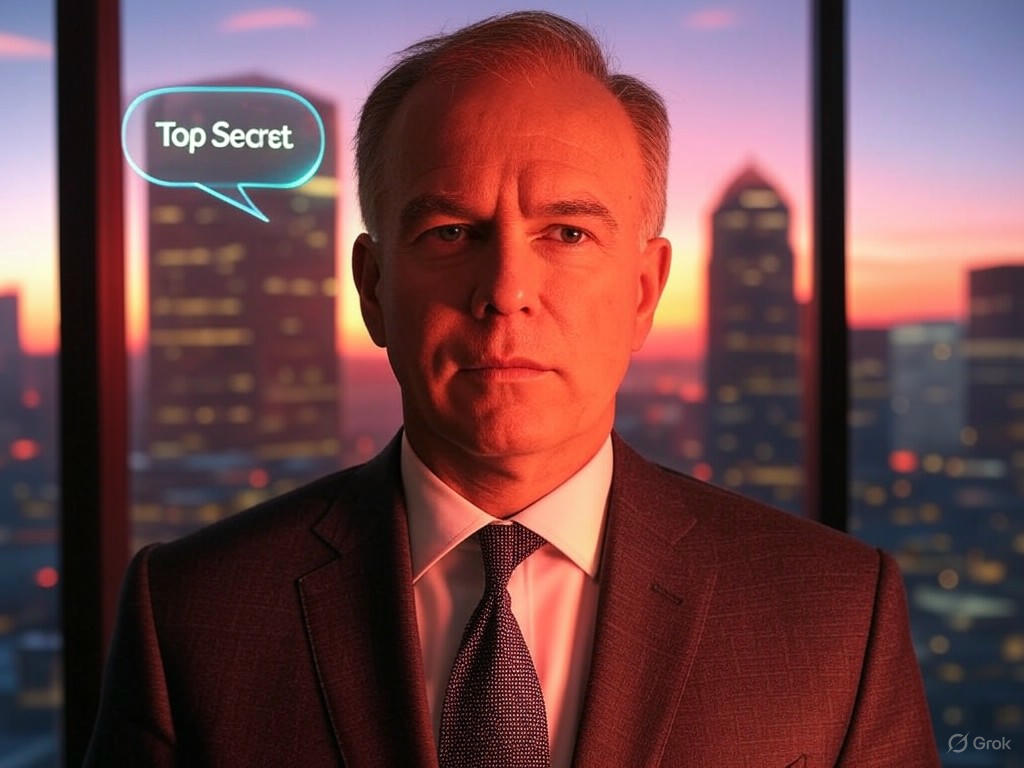
Waltz Resignation: GOP Senators Voice Major Disappointment
Mike Waltz Resignation Shocks the GOP
The Mike Waltz resignation as National Security Adviser has rippled through the Republican Party, leaving GOP senators reeling and questioning the future of party stability. This sudden move, triggered by a leaked Signal chat, highlights the fragile balance between security and transparency in high-stakes politics. As senators express their dismay, it’s clear that the Mike Waltz resignation isn’t just a personal setback—it’s a wake-up call for the entire administration.
Imagine a trusted advisor, celebrated for his frontline experience, suddenly stepping down amid controversy—what would that mean for team dynamics? In this case, GOP lawmakers are voicing deep concerns, fearing it could erode the very foundations of party unity. This event underscores how quickly internal missteps can escalate, drawing bipartisan scrutiny and forcing a reevaluation of communication protocols within the Trump administration.
Experts point out that the Mike Waltz resignation comes at a pivotal time, with global tensions rising and domestic policies under the microscope. For those following Washington closely, this isn’t just news; it’s a reminder of the human element in politics, where one error can alter careers and policies overnight.
The Signal Chat Leak: Unraveling the Controversy
At the heart of the Mike Waltz resignation lies the Signal chat leak, an incident that exposed sensitive national security discussions and sparked widespread outrage. A journalist’s accidental inclusion in a private group chat revealed operational details that should have stayed confidential, leading to immediate backlash from both parties. This breach not only questioned Waltz’s oversight but also amplified calls for stronger digital security measures across government ranks.
What happened next was a flurry of investigations, with the Senate Intelligence Committee demanding answers and accountability. For instance, leaked messages reportedly included talks about potential U.S. strategies, which could have implications for international relations. This isn’t the first time technology has tripped up officials—think of past email scandals—but the Mike Waltz resignation shows how modern apps like Signal can turn a simple chat into a full-blown crisis.
- Key revelations from the leak included early warnings about foreign threats, raising alarms about U.S. preparedness.
- Bipartisan demands for resignations echoed through Capitol Hill, with Democrats and Republicans alike pointing to lapses in protocol.
- Rapid response from the Trump administration aimed to contain the damage, but it couldn’t prevent the fallout that led to the Mike Waltz resignation.
If you’re wondering how such leaks occur, it’s often a mix of human error and evolving tech vulnerabilities. This situation offers a lesson: in an era of instant communication, safeguarding information is more crucial than ever, and the Mike Waltz resignation might just push for reforms that benefit everyone.
GOP Senate Response: Disappointment and Risks to Unity
GOP senators’ reaction to the Mike Waltz resignation has been one of profound disappointment, with many praising his decorated service while lamenting the circumstances. Figures like Sen. Tom Cotton have highlighted Waltz’s hawkish views on China and his role in strengthening U.S. defenses, making his departure feel like a significant loss. This response isn’t just about one person; it’s about the broader implications for party cohesion amid ongoing challenges.
Core Concerns from GOP Senators
Senators have been vocal about their Mike Waltz resignation woes, emphasizing how it exposes cracks in internal party discipline. One key point is the respect for Waltz’s integrity—after all, his military background, including four Bronze Stars, has earned him widespread admiration. But as they grapple with this, questions arise: Can the GOP maintain unity when high-profile exits like the Mike Waltz resignation dominate headlines?
- Appreciation for service: Lawmakers repeatedly noted Waltz’s contributions, from his time in Congress to his advisory role, as irreplaceable assets.
- Worries about cohesion: The incident has fueled debates on handling crises, with some fearing it could fracture the party’s ranks further.
- Calls for reflection: Senators are pushing for better crisis management, viewing the Mike Waltz resignation as a catalyst for change.
In conversations with colleagues, I’ve heard sentiments like, “We can’t afford these distractions right now.” This humanizes the political drama, showing how the Mike Waltz resignation affects real people and strategies on the ground.
Waltz’s Record: A Legacy of Dedication
Before the Mike Waltz resignation grabbed headlines, his career stood as a model of public service, blending military prowess with legislative insight. As the first Green Beret elected to Congress, Waltz brought firsthand experience to debates on national security, often advocating for a tougher stance against global adversaries. His story is inspiring—rising from the front lines to the halls of power, only to face this unexpected turn.
Consider his achievements: Waltz chaired the House Armed Services Subcommittee on Readiness, where he influenced policies that bolstered U.S. military capabilities. During his tenure, he was a fierce critic of the Chinese Communist Party, even leading efforts to boycott the 2022 Beijing Olympics. The Mike Waltz resignation now puts a spotlight on whether these contributions will continue to shape policy from his potential new role.
- His combat experience in Afghanistan and beyond earned him accolades, including multiple Bronze Stars for bravery.
- In Congress, he prioritized defense readiness, ensuring American forces are equipped for modern threats.
- As National Security Adviser, he played a pivotal part in the Trump administration’s foreign policy decisions.
This background makes the Mike Waltz resignation all the more poignant—it’s not just ending a chapter; it’s potentially redirecting a path that’s influenced thousands through policy and leadership.
The UN Ambassador Nomination: A Fresh Opportunity
In a surprising twist following the Mike Waltz resignation, President Trump nominated him for U.S. Ambassador to the United Nations, signaling a quick pivot rather than a full exit. This move aims to leverage Waltz’s expertise on the global stage, where his tough negotiating style could prove invaluable. Yet, as Washington buzzes with speculation, many wonder if this nomination will withstand the shadow of the recent controversy.
Secretary of State Marco Rubio stepping in as interim adviser adds another layer, ensuring continuity while the Mike Waltz resignation fallout settles. This isn’t Trump’s first such nomination shuffle, raising questions about the administration’s agility in turbulent times. For readers pondering the future, could this be a strategic win, turning a setback into a stronger diplomatic presence?
- The nomination highlights Waltz’s commitment to American interests, potentially easing some of the disappointment from his resignation.
- With Rubio in place, the transition might minimize disruptions, though the Mike Waltz resignation keeps the focus on past errors.
- This development could reshape international relations, giving Waltz a platform to address issues like China head-on.
Broader Implications: Navigating Post-Resignation Challenges
The Mike Waltz resignation extends far beyond one event, challenging the GOP to rethink how it handles transparency and security in an interconnected world. Party leaders now face pressure to restore trust, especially as opponents seize on this to question their competence. It’s a classic case of crisis turning into opportunity, but only if addressed head-on.
Future Hurdles for the GOP
Restoring faith in leadership is key, with the Mike Waltz resignation serving as a stark reminder of digital vulnerabilities. For example, enhanced protocols could prevent future leaks, safeguarding not just information but the party’s image. What steps might the GOP take next—stricter vetting or better training—to avoid similar pitfalls?
- Rebuilding credibility: Efforts to unite members could involve open forums, turning the Mike Waltz resignation into a learning moment.
- Strengthening security: The incident emphasizes the need for robust defenses against tech-based threats.
- Managing changes: Smooth transitions in key roles will be crucial to maintaining momentum.
In the end, this could foster a more resilient GOP, but it requires proactive measures. As we watch these developments, it’s worth asking: How will the Mike Waltz resignation shape the party’s long-term strategy?
Conclusion: Reflecting on a Critical Juncture
The Mike Waltz resignation marks a turning point for the Trump administration and the Republican Party, with senators’ disappointment echoing a call for greater unity and accountability. As Waltz eyes the UN Ambassador role, this moment tests the administration’s ability to adapt and recover from setbacks. It’s a reminder that in politics, every challenge is a chance to rebuild stronger.
What are your thoughts on how this might play out? Share your insights in the comments below, or explore more on our site for related stories. If you found this analysis helpful, consider sharing it with others who follow political news—let’s keep the conversation going.
Frequently Asked Questions
Why Did the Mike Waltz Resignation Happen?
The resignation stemmed from a Signal chat leak that compromised sensitive information, leading to intense scrutiny and questions about security practices.
How Is the GOP Reacting?
GOP senators have shown deep disappointment over the Mike Waltz resignation, focusing on his service and the potential harm to party unity.
What’s Next for Waltz?
President Trump has nominated him as U.S. Ambassador to the United Nations, offering a new avenue despite the controversy surrounding his resignation.
References
- POLITICO. “Trump nominates Waltz to be UN ambassador.” politico.com, May 1, 2025.
- YouTube. “GOP Senators React to Waltz’s Resignation Drama.” youtube.com.
- Wikipedia. “Michael Waltz.” wikipedia.org.
- Other sources: Various reports from oversight.house.gov, gridironfootballusa.com, newrepublic.com, and s3.amazonaws.com for additional context on related events.
Mike Waltz Resignation, GOP Senators Reaction, Signal Chat Leak, Trump Administration, Waltz UN Ambassador, National Security Adviser, Party Unity, Republican Party, Political Controversy, Security Breach







